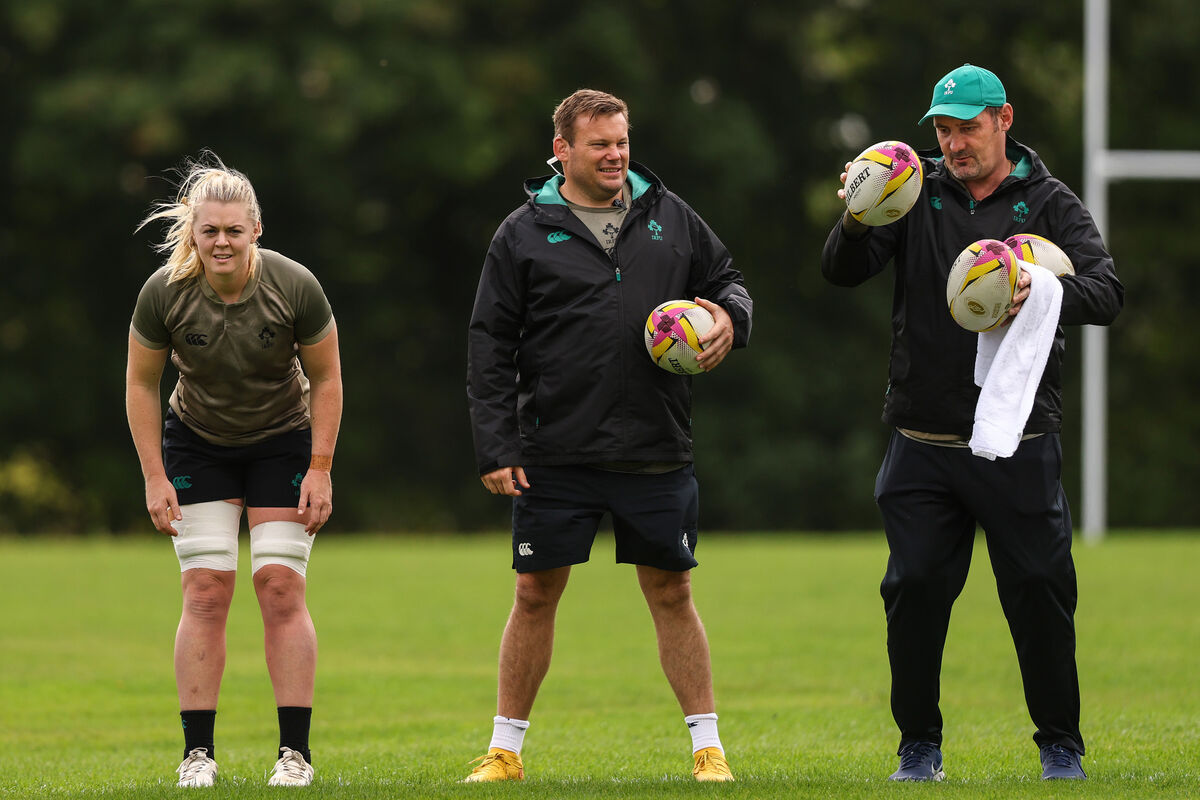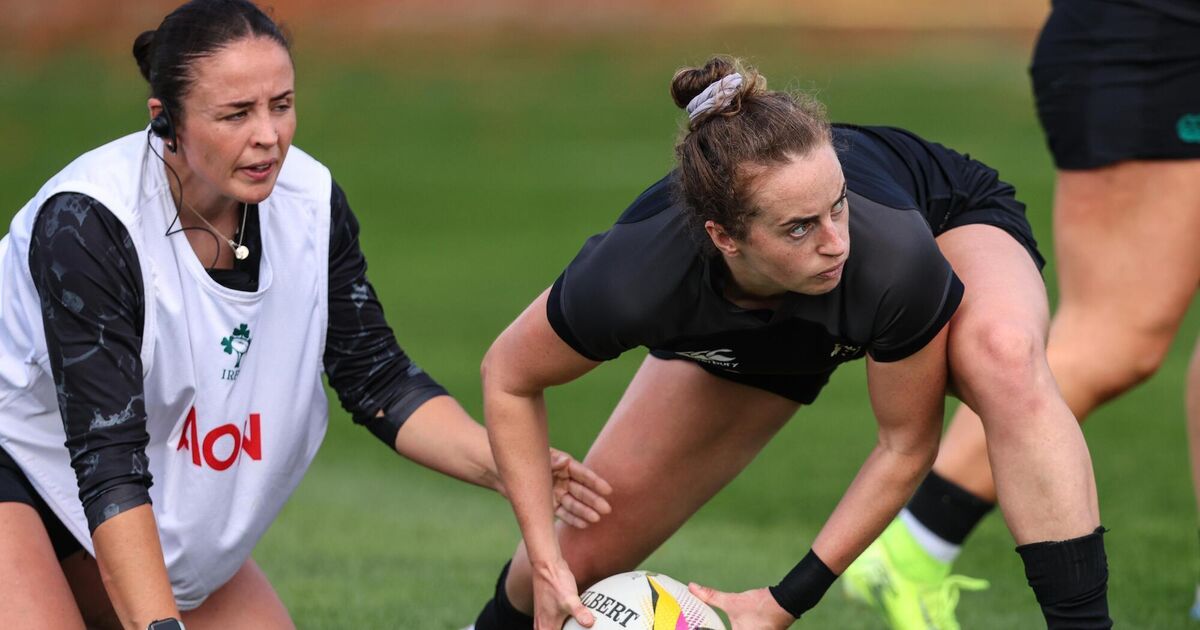Attendances are up at the Women’s Rugby World Cup, and standards with them. If there have been far too many blowouts across the pool stages then no-one seriously doubts the fact that the game is travelling in the right direction.
World Rugby have been eager to say as much. It started long before a ball was kicked or thrown. Among their early communications was the surge in the number of women on coaching staffs which, like other team sports, can still be dominated by men.
There are 23 female coaches across the 16 teams in England. That’s basically a third of the total and a leap from the half-dozen that played a part in the last tournament three years ago. Dig even deeper into the support staffs and the split is 60-40 between men and women.
Larissa Muldoon, a player from Ireland’s golden generation, is one of those in a coaching brief, but the gender balance drops the higher up the tree people climb. Only three of the 16 teams — France, Australia and Japan — have women in the top job.
And that’s a record in itself.
Muldoon follows on from Marie Louise Reilly and Niamh Briggs, both of whom had roles with the national squad before her in recent years, and that sort of turnover is repeated across the page where new IRFU contracts have been written time and again.
Scott Bemand is just two years into his project now. The Englishman took over from Greg McWilliams and he follows in the footsteps of men like Adam Griggs and Tom Tierney who had picked up the baton from the highly successful Philip Doyle.
Bemand has done a superb job up to now, taking a squad that had lost too many games and too many top players at a time when the player base, old and new, was at war with the union, and resurrecting form on the pitch and the mood music away from it.
“He is a very good communicator,” says front row Niamh O’Dowd. “He obviously covers all of our attack so he kind of has it all laid out, sorted for us. But at the same time, you never feel, ‘I have to rigidly stick to this exact plan’. Everyone’s given freedom to express themselves within the system, which is great, because you never feel like you’re being put in a box.
“He’ll try to work to people’s strengths, if someone’s good at something, or he’ll bring that into the game plan. To be honest, it has been great over the last, how long has he been in now, almost two years? It’s been a real step up. Obviously he was involved with the Red Roses before. So he brings a lot of experience from that. They’re where we want to get to.
“I’m sure he has a lot of ideas from what he picked up in that environment and he’s brought them in. I’d say pretty, kind of straightforward. Everything makes sense.”
The other near constant has been scrum coach Denis Fogarty whose jovial personality matches his brother John. Like the Ireland men and British and Irish Lions coach, this Fogarty also brings a seriously analytical mind to the table.
 Sam Monaghan, Scrum Coach Denis Fogarty and Forwards Coach Alex Codling at squad training in Brighton. Pic: Ben Brady/Inpho
Sam Monaghan, Scrum Coach Denis Fogarty and Forwards Coach Alex Codling at squad training in Brighton. Pic: Ben Brady/Inpho
Linda Djougang has seen plenty of coaches come and go across her 50 caps to date and she credits Fogarty with a huge role in advancing her scrummaging abilities at the highest level, and in identifying talent as part of his wider remit with the IRFU.
“He gets involved in the scrum. He challenges us,” says the Ireland tighthead. “Scrummaging is all about feeling and he’s able to step in, be like, ‘Okay, let me see, let me feel it too, let me see how we can change’.” Fogarty aside, there have been lots of moving parts in the backroom.
James Scaysbrook came in to work on the defence only a handful of months ago. This after the shock departure of the highly-rated Hugh Hogan from a system that had previously lost Declan Danaher to the English Premiership.
That’s three ‘D’ gurus since January of last year and Ireland have conceded an average of over 3.5 tries a game across 2025 with Spain managing five last week. That’s a major concern as they face the Black Ferns in Brighton on Sunday.
“It’s similar to what we were doing, let’s say, in Six Nations,” says O’Dowd of their approach without the ball. “There’s nothing major that’s completely different, or anything like that. Kind of like Scott, he wants us to express ourselves.
“He doesn’t want to put you in a box. Like, if you’re good at something go for it. He’s very much about getting the best out of players and just getting players in the right headspace to perform when they’re in defense.” Other alterations behind the scenes?
It’s just over a year ago since Alex Codling took over the forwards brief. Labelled a lineout ‘Jedi’ by the players, he will sign off after this tournament and concentrate all his energies on Munster having already worked with the province as a consultant.
Gareth Steenson, not long in the door as kicking coach, will take up a job with Royal Belfast Academy once the World Cup is done, and it remains to be seen how Johnny Sexton works his new, wide-ranging role with the union that encompasses the men’s and women’s games.
It’s a lot of change. Too much?
The No.8 Brittany Hogan isn’t alone in looking at all these new voices in a positive light. More ideas has been equated to more lessons and growth, the theory being that a team gaining in experience all the time is claiming ownership of its journey bit by bit.
“So we take what the coaches bring on, maybe suggest to the new coach coming in, ‘Oh, this is actually what we normally do’. If he likes it, great. If he doesn’t, then he kind of adapts it a wee bit. But they’ve been brilliant at taking that player perspective on and making sure that we’re all working as a team.”
Denis Fogarty: A former Ireland ‘A’ hooker. Fogarty won a Celtic League and Heineken Cup medal in his eight years with his native Munster before spells in France with Aurillac, Agen and Provence and a forced retirement through injury in 2016.
Younger brother of Ireland and British and Irish Lions assistant coach John Fogarty, Denis moved into the corporate role while starting down the coaching route with Cork Constitution. Now scrum coach and a throwing specialist with the women’s team and IRFU.
James Scaysbrook: A flanker who spent 15 years playing with Bath and Exeter Chiefs before retirement a decade ago, Scaysbrook has taken over from the highly-rated Hugh Hogan, whose departure post-Six Nations was a huge surprise, with the Ireland women’s team.
Started his coaching journey with three years with Kowloon Rugby Club in Hong Kong and had short shifts in various roles with Toyota Shuttles in Japan, the England U20s and Plymouth Albion before five years as defence coach with Championship side Coventry.
Alex Codling: Once a player with Harlequins, Saracens and Northampton Saints, and capped by England in 2002, Codling was head coach of Newcastle Falcons and part of the Egland senior men;s team staff before joining up with Ireland.
Codling came on board just prior to the WXV1 tournament in Canada last year when the team surprised everyone and has held a consulting role with Munster with whom he will concentrate his efforts as forwards coach after this World Cup.
Larissa Muldoon: One of the golden generation of players, Muldoon won two Six Nations with Ireland and was part of that legendary win against New Zealand in 2014. She also played at the next World Cup three years later.
Joined the Ireland women’s programme in the autumn of 2023. In 2024 she went on a coaching sabbatical to New Zealand and returned to the Ireland set up before the 2025 Six Nations. She is also the Women’s National Talent Manager in Connacht Rugby.
Gareth Steenson: The kicking coach on Scott Bemand’s staff, Steenson had to leave his native Ulster for want of playing opportunities and spent a few seasons establishing himself with Rotherham Titans and Cornish Pirates before getting a move to Exeter Chiefs.
Player and club flew up the ranks together by winning the Championship, two Premierships and a Champions Cup and the out-half hadn’t retired by the time he started coaching with Plymouth Albion. Has also coached with the Chiefs and City

